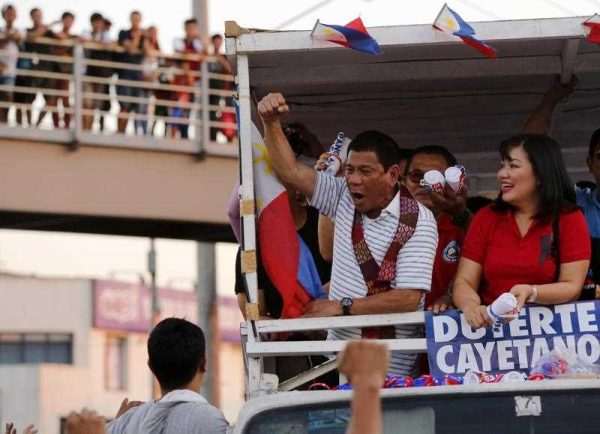His continued pole position in the election surveys shows his candidacy has survived the backlash from the controversial remarks he made concerning the rape and murder of an Australian missionary. In a last ditch effort to halt his momentum, vice presidential candidate Antonio Trillanes IV unleashed an expose accusing Duterte of keeping billions of pesos in secret bank accounts. But this also appears too late.
The Duterte phenomenon is not a revolt of the poor. It is middle class-driven. It is angry protest most acute among the modestly successful, including call centre workers, Uber drivers and overseas Filipino workers.
In the 26–29 April Pulse Asia Research survey, Duterte was selected by 37 per cent of class ABC, way ahead of Grace Poe’s 19 per cent, Roxas’s 18 per cent and Vice President Jejomar Binay’s 14 per cent. It is estimated that class ABC accounts for an estimated 10 per cent of the population. Class AB (the rich and upper-middle class) accounts for only 1 per cent, while class C (middle class) comprises the remaining 9 per cent.
The angry middle class constitute an emerging counter-elite, who feel left out by the ruling oligarchy. Duterte’s emerging neo-authoritarian constituency was initially concentrated among some elites and the middle class, and has only recently gained electoral support from the poor.
The rapid rise of voter support for Duterte, despite his late entry into the race, highlights the pent-up anger among the middle class at the deterioration of public order and concerns about growing drug abuse. They were supposed to be the beneficiaries of the Daang Matuwid (‘straight path’) — the name the current administration of Benigno Simeon ‘Noynoy’ C. Aquino III gives its own efforts at promoting good governance.
Despite robust economic growth during the past six years of the Aquino presidency, the middle class suffers from a lack of public services, horrendous land and air traffic, persistent corruption and fears about the breakdown of peace and order. They see the poor receiving conditional cash transfers, while the rich profit from public–private partnerships, and feel short-changed.
This anger has fuelled Duterte’s candidacy and poses a grave danger to the country’s fragile democratic institutions. Duterte has promised to ‘clean up the country’ within six months and has threatened to abolish Congress or tame the courts if they try to stand in the way of his crackdown on crime and corruption.
Duterte promises to restore ‘peace and order’ much as Ferdinand Marcos (who Duterte admires) did when he seized dictatorial power in 1972. This echoes the middle class support initially given to Marcos during the early part of his dictatorship.
To make matters worse, Ferdinand ‘Bongbong’ R. Marcos, Jr., the son of the dictator Ferdinand Marcos, is now in a statistical tie for the lead in polls for vice presidency (which is elected separately). This is an ominous sign. The younger Marcos refuses to apologise for the crimes of his father’s regime, including both its human rights violations and economic plunder, which he flat out denies.
This follows a global trend towards neo-authoritarianism — autocrats seeking electoral mandates to undermine recently restored democracies. These include Vladimir Putin of Russia, Abdul Fattah Al-Sisi of Egypt and Prayut Chan-o-cha of Thailand. Neighbouring Indonesia had a close call recently when one of the most repressive generals of the Suharto dictatorship, Prabowo Subianto, nearly won the 2014 presidential elections. Brazil is also undergoing some nostalgia for military dictatorship amid the impeachment charges against President Dilma Rousseff. This trend indicates that many newly democratic countries have failed to consolidate democratic institutions.
Duterte’s campaign calling card has been his record as mayor of the once rough city of Davao in the southern island of Mindanao, which he claims to have pacified by going after drug gangs, murderers and other criminals. He is known as ‘the punisher’ for his willingness to kill supposed criminals first and refuse to answer questions later. He has shrugged off accusations of human rights violations, promising to implement his Davao model nationwide.
Duterte also draws on opposition to the so-called ‘imperial Manila’ as the first mayor from a major city outside Manila to launch a major presidential bid. He has called for a federal system, which resonates particularly well in Mindanao but also in parts of the Visayas islands.
The country is seeing the emergence of what noted sociologist Randy David calls ‘Dutertismo.’ According to David, ‘calling Duterte a fascist would probably not mean anything to the average Filipino. If at all, it might focus inordinate attention on the man himself and the dark charisma he projects, when what is needed is to understand the movement he has given life to and the collective anger and despair it represents.’
Duterte’s repeated threats to abolish Congress and tame the courts if they do not prove cooperative with his radical plans to implement ‘peace and order’ do not bode well for the archipelago’s often fragile democratic institutions.
Julio C. Teehankee is Professor of Political Science and International Studies and Dean of the College of Liberal Arts at De La Salle University.
Mark R Thompson is currently head of the Department of Asian and International Studies in the City University of Hong Kong.

